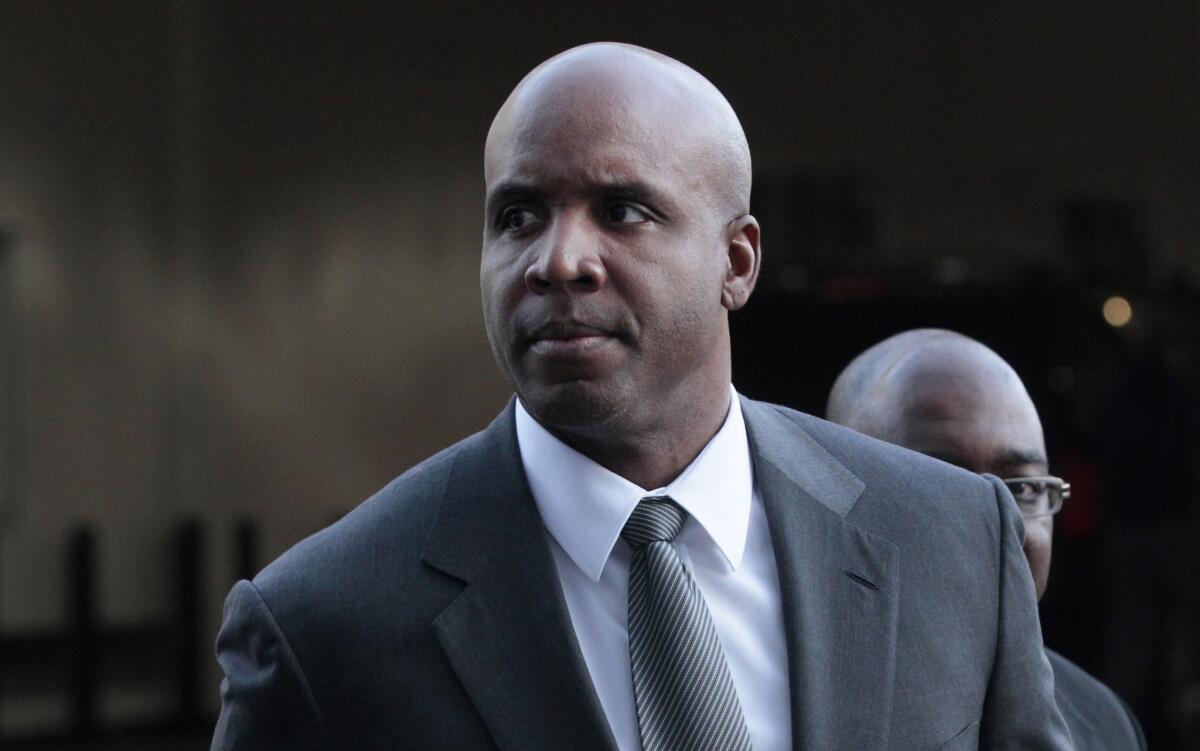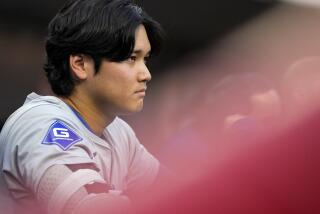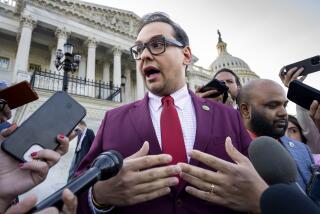Barry Bonds’ conviction for obstruction of justice is upheld

- Share via
SAN FRANCISCO — A federal appeals court Friday unanimously upheld former San Francisco Giant Barry Bonds’ conviction for obstructing justice for a rambling answer he gave to a federal grand jury investigating doping in professional sports.
The three Democratic appointees on the U.S. 9th Circuit Court of Appeals panel agreed that Bonds’ response to a grand jury question in 2003 amounted to obstruction because it was both evasive and misleading, and contradicted by trial evidence.
Bonds said he was disappointed and would appeal but wanted to start serving his sentence immediately: 30 days of house arrest, two years of probation and 250 hours of community service in youth-related activities.
In a statement posted on his website, major league baseball’s career home run leader did not specify his next legal move, but he could ask a larger panel of the 9th Circuit to review the case. He called the U.S. justice system “the best in the world” and thanked the judges and staff of the 9th Circuit “for the difficult work that they do.”
“This has been a long and difficult chapter in my life, and I look forward to moving beyond it once I have fulfilled the penalties ordered by the court,” he said.
Bonds was asked during the grand jury proceedings whether Greg Anderson, his former personal trainer, had given him something he could administer to himself by injection. The following exchange formed the basis of his conviction:
Bonds: “I’ve only had one doctor touch me. And that’s my only personal doctor. Greg, like I said, we don’t get into each other’s personal lives. We’re friends, but I don’t — we don’t sit around and talk baseball, because he knows I don’t want — don’t come to my house talking baseball. If you want to come to my house and talk about fishing, some other stuff, we’ll be good friends, you come around talking about baseball, you go on. I don’t talk about his business. You know what I mean?”
Prosecutor: “Right.”
Bonds: “That’s what keeps our friendship. You know, I am sorry, but that — you know, that — I was a celebrity child, not just in baseball by my own instincts. I became a celebrity child with a famous father. I just don’t get into other people’s business because of my father’s situation, you see.”
Prosecutor: “And, again, I guess we’ve covered this, but — did [Anderson] ever give you anything that he told you had to be taken with a needle or syringe?”
Bonds: “Greg wouldn’t do that. He knows I’m against that stuff. So, he would never come up to me — he would never jeopardize our friendship like that.”
Prosecutor: “OK. So, just so I’m clear, the answer is no to that, he never gave you anything like that?”
Bonds: “Right.”
Bonds’ lawyers argued that he could not be guilty of a crime for giving a long-winded but truthful response to the question, which he eventually answered. But the 9th Circuit said Bonds’ response was intended to mislead.
His description of life as a child surrounded by celebrities — his father, major leaguer Bobby Bonds, and godfather, Giants legend Willie Mays — “had nothing to do with the question,” the court said. His remarks were evasive because they “served to divert the grand jury’s attention away from the relevant inquiry of the investigation.”
Bonds’ response also was “at the very least misleading because it implied that Bonds did not know” whether Anderson distributed steroids and performance-enhancing drugs, the court said. A prosecution witness testified at trial that Bonds told him he knew that Anderson provided steroids.
“When factually true statements are misleading or evasive, they can prevent the grand jury from obtaining truthful and responsive answers,” Judge Mary M. Schroeder, appointed by President Carter, wrote for the panel. “They may therefore obstruct and impede the administration of justice.”
The federal government began investigating steroid distribution in 2002 and raided the Bay Area Laboratory Co-operative (BALCO). The raid produced evidence that Anderson provided Bonds and other professional athletes with banned drugs designed to improve their athletic prowess.
Bonds, one of several athletes called by the grand jury, testified under a grant of immunity that he had never knowingly used such drugs. Prosecutors said he lied under oath, despite having immunity, and charged him with perjury and obstruction. The trial jury deadlocked on the perjury counts.
U.S. Atty. Melinda Haag, whose office prosecuted Bonds, said she was “gratified” by the ruling and believed “justice is served.”
More to Read
Sign up for Essential California
The most important California stories and recommendations in your inbox every morning.
You may occasionally receive promotional content from the Los Angeles Times.














